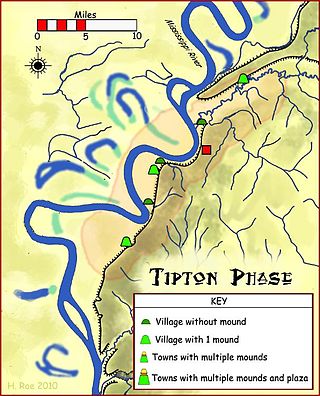
Tennessee, officially the State of Tennessee, is a landlocked state in the Southeastern region of the United States. It borders Kentucky to the north, Virginia to the northeast, North Carolina to the east, Georgia, Alabama, and Mississippi to the south, Arkansas to the southwest, and Missouri to the northwest. Tennessee is the 36th-largest by area and the 15th-most populous of the 50 states. Tennessee is geographically, culturally, and legally divided into three Grand Divisions of East, Middle, and West Tennessee. Nashville is the state's capital and largest city, and anchors its largest metropolitan area. Other major cities include Memphis, Knoxville, Chattanooga, and Clarksville. Tennessee's population as of the 2020 United States census is approximately 6.9 million.

Memphis is a city in the U.S. state of Tennessee. It is the seat of Shelby County, in the southwesternmost part of the state, and is situated along the Mississippi River. With a population of 633,104 at the 2020 U.S. census, Memphis is the second-most populous city in Tennessee after Nashville.

Shelby County is the westernmost county in the U.S. state of Tennessee. As of the 2020 census, the population was 929,744. It is the largest of the state's 95 counties, both in terms of population and geographic area. Its county seat is Memphis, a port on the Mississippi River and the second most populous city in Tennessee. The county was named for Governor Isaac Shelby (1750–1826) of Kentucky. It is one of only two remaining counties in Tennessee with a majority African American population, along with Haywood County.

The United Confederate Veterans was an American Civil War veterans' organization headquartered in New Orleans, Louisiana. It was organized on June 10, 1889, by ex-soldiers and sailors of the Confederate States of America as a merger between the Louisiana Division of the Veteran Confederate States Cavalry Association; N. B. Forrest Camp of Chattanooga, Tennessee; Tennessee Division of the Veteran Confederate States Cavalry Association; Tennessee Division of Association of Confederate Soldiers; Benevolent Association of Confederate Veterans of Shreveport, Louisiana; Confederate Association of Iberville Parish, Louisiana; Eighteenth Louisiana; Adams County (Mississippi) Veterans' Association; Louisiana Division of the Army of Tennessee; and Louisiana Division of the Army of Northern Virginia.

West Tennessee is one of the three Grand Divisions of Tennessee that roughly comprises the western quarter of the state. The region includes 21 counties between the Tennessee and Mississippi rivers, delineated by state law. Its geography consists primarily of flat lands with rich soil and vast floodplain areas of the Mississippi River. Of the three regions, West Tennessee is the most sharply defined geographically, and is the lowest-lying. It is both the least populous and smallest, in land area, of the three Grand Divisions. Its largest city is Memphis, the state's second most populous city.

The Commercial Appeal is a daily newspaper of Memphis, Tennessee, and its surrounding metropolitan area. It is owned by the Gannett Company; its former owner, the E. W. Scripps Company, also owned the former afternoon paper, the Memphis Press-Scimitar, which it folded in 1983. The 2016 purchase by Gannett of Journal Media Group effectively gave it control of the two major papers in western and central Tennessee, uniting the Commercial Appeal with Nashville's The Tennessean.

Shelby Dade Foote Jr. was an American writer, historian and journalist. Although he primarily viewed himself as a novelist, he is now best known for his authorship of The Civil War: A Narrative, a three-volume history of the American Civil War.
Raleigh is a community in north-central Memphis, Tennessee, United States, named for a formerly incorporated town that used to be at its center. Raleigh is bordered on the west by the community of Frayser, on the east by the incorporated suburb of Bartlett, on the south by the Wolf River and Interstate 40, and on the north by the Memphis city limits. The former town of Raleigh was the first county seat of Shelby County, Tennessee.

Athens is an unincorporated community in Monroe County, Mississippi.

Elmwood Cemetery is the oldest active cemetery in Memphis, Tennessee. It was established in 1852 as one of the first rural cemeteries in the South.

The history of Memphis, Tennessee and its area began many thousands of years ago with succeeding cultures of indigenous peoples. In the first millennium, it was settled by the Mississippian culture. The Chickasaw Indian tribe emerged about the 17th century, or migrated into the area. The earliest European exploration may have encountered remnants of the Mississippian culture by Spanish explorer Hernando de Soto. Later French explorers led by René-Robert Cavelier, Sieur de La Salle likely encountered the Chickasaw. The city of Memphis was not founded until 1819. The city was named after the ancient capital of Egypt on the Nile River in North Africa.

Randolph is a rural unincorporated community in Tipton County, Tennessee, United States, located on the banks of the Mississippi River. Randolph was founded in the 1820s and in 1827, the Randolph post office was established. In the 1830s, the town became an early center of river commerce in West Tennessee. Randolph shipped more cotton annually than Memphis until 1840. In 1834, the first pastor of the Methodist congregation was appointed. The fortunes of the community began to decline in the late 1840s due to failed railroad development, an unfavorable mail route and other factors. The first Confederate States Army fort in Tennessee was built at Randolph early in the Civil War in 1861, a second fortification at Randolph was constructed later that same year. During the Civil War, the town was burned down twice by Union Army forces.

The Nicholas Gotten House is located on 2969 Court Street in Bartlett, Tennessee, United States. It houses the Bartlett Museum, a local history museum operated by the Bartlett Historical Society.

Randolph is an unincorporated rural community in Tipton County, Tennessee, United States, located on the banks of the Mississippi River. The lands of the Mississippi River Basin were inhabited by Paleo-Indians and later Native American tribes of the Mississippian culture for thousands of years. The Tipton phase people and the Chickasaw Indian tribe populated the Mississippi River valley near Randolph during the Mississippian period. In 1541, Spanish explorer Hernando de Soto crossed the Mississippi River at or near Randolph. French explorer Cavelier de La Salle built the first French fortification at or near Randolph on his 1682 canoe expedition of the Mississippi River.
The following is a timeline of the history of the city of Memphis, Tennessee, US.
Robert F. Looney was an American soldier, lawyer, and businessman. Elected colonel of the 38th Tennessee Regiment, Looney served in the Confederate Army during the American Civil War, fighting in the battle of Shiloh. After the war, Looney worked on the preservation commission for the Shiloh National Military Park, which had been established by Congress in December 1894.
John Preston Young (1847–1934) was an American Confederate veteran, judge and historian.

Lunsford Pitts Yandell Jr. was an American physician and professor at Memphis Medical College and the University of Louisville School of Medicine. He served as a surgeon in the Confederate States Army during the American Civil War.

Tipton Female Seminary, also known as Tipton Female Academy, was a female seminary established in 1854 in Covington, Tennessee. It closed sometimes around c. 1894.














